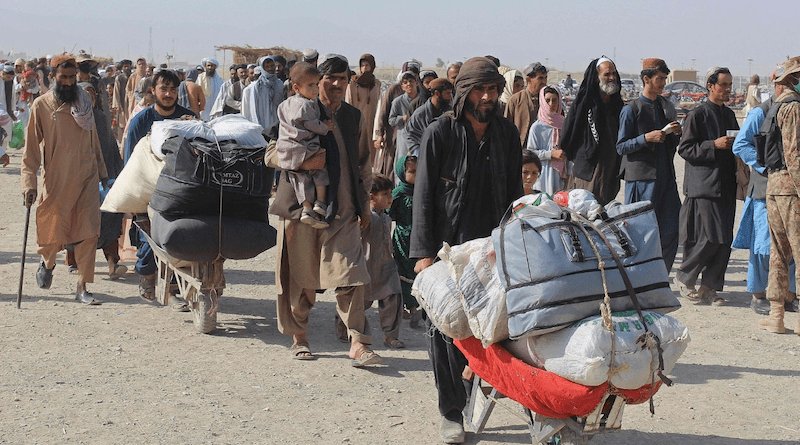Pakistan’s Solidarity With Afghan Refugees And Recent Prisoners Release – OpEd
The recent release of 290 Afghan citizens in the next two months will reinforce Pakistan’s sincere efforts to help Afghan refugees. These people were put in prison for not having any legal documentation. Pakistani authorities have released 2350 citizens out of 2600, which is a good gesture. The Soviet Union’s invasion of Afghanistan and America’s war on terror created refugee crises in South Asia. Pakistan shares 2640 kilometers (KM) of long borders and is an immediate neighbor of Afghanistan, resulting in a massive influx of refugees towards Pakistan.
The statistics indicate that at least one million people reached Pakistan following the Soviet invasion, and the figures went higher again during the war on terror and reached 3.7 million, of which only 1.29 million were registered.
The influx of Afghan refugees in Pakistan harms the country’s economy. According to research, Afghan refugees lower actual economic activity in Pakistan in both the short and long run. They also strain scarce resources and services and contribute to weapons and drug trafficking. Pakistan, already poor and unstable, cannot afford to host millions of refugees without adequate international support.
Despite these hurdles, Pakistan provided asylum to all the refugees who came to Pakistan. Any country does not allow refugees to roam around, including Turkey or Iran, without legal documentation, but they have restricted the asylums to a specific area. Pakistan deserves recognition and appreciation for its hospitality and generosity towards Afghan refugees over the past 40 years. Pakistan has provided shelter and safety to millions of Afghans fleeing war and violence and ensured their dignity and human rights by granting them access to education, banking, and livelihood opportunities.
Pakistan has maintained the highest protection standards for Afghan refugees, even during the COVID-19 pandemic, when many countries closed their borders and restricted the movement of refugees. Pakistan has shown solidarity and compassion with its Afghan brothers and sisters, despite facing economic and social challenges of its own. Pakistan has also supported the peace and stability of Afghanistan and facilitated the voluntary repatriation of refugees who wish to return to their homeland. The international community should acknowledge and support Pakistan’s exemplary role as a host country.
According to UNHCR, Pakistan hosts the largest Afghan refugee population of about three million. In contrast, more or less one million undocumented refugees have also resided in Pakistan since the Soviet invasion. It has been host to Afghan refugees for about four decades, with many Afghan nationals born there. Pakistan hosts more than 1.4 million registered Afghans. Enrollment in government elementary schools is free, and students have access to further education through significant scholarships, bank accounts, and a variety of job options. The peace and stability of Afghanistan facilitated the voluntary repatriation of refugees who wished to return to their homeland.
On the contrary, around 11,000 Afghans in India have registered as asylum seekers but are not legally recognized as refugees. However, India claims to be an ally and friend of Afghanistan. Unlike Pakistan, neighbors like Iran and Turkiye have strict policies for Afghan asylum seekers and refugees, including area restrictions (inside host countries) and forced repatriation to Afghanistan.
Pakistan has been hosting Afghan refugees for four decades; it is time to reciprocate Pakistan’s generosity and goodwill. The international community should acknowledge and appreciate Pakistan’s exemplary role as a host country and provide adequate financial and technical support to Pakistan and the refugees. The international community should also work together to find durable solutions for the Afghan refugees, such as voluntary repatriation, local integration, or resettlement in third countries. The international community should back the peace process in Afghanistan and help make it so that refugees may return home safely and respectfully.
The goal of a peaceful and stable Afghanistan, where refugees may return and start over, will influence Pakistan’s future approach toward Afghan refugees. Pakistan backs the Afghan peace process and wants the international community to help the country and its refugees. Pakistan also requests that the international community help shoulder the burden of housing Afghan refugees by providing relocation possibilities and financial and technical aid to Pakistan and the refugees. Pakistan is hopeful that its Afghan neighbors will repay the kindness shown to them by Pakistan.
There will be positive effects on relations between the two countries due to Pakistan’s plan to release more than 290 Afghans from prison over the next two months. Pakistan has taken in millions of Afghan refugees over the last four decades; thus, the release of these inmates, who were held for missing legal documentation, is a gesture of kindness and compassion on the part of the Pakistani government.
Releasing these prisoners will also make it easier for them to voluntarily return to Afghanistan, where they may be reunited with loved ones and help build a better future for their nation. The release of these prisoners is in line with the goals of the National Policy on Afghan Refugees and the Solutions Strategy for Afghan Refugees, which are to ensure the safety and respect of Afghan refugees in Pakistan and to help them successfully reintegrate into Afghan society. The two countries have restored hope and fraternity by releasing these convicts.

